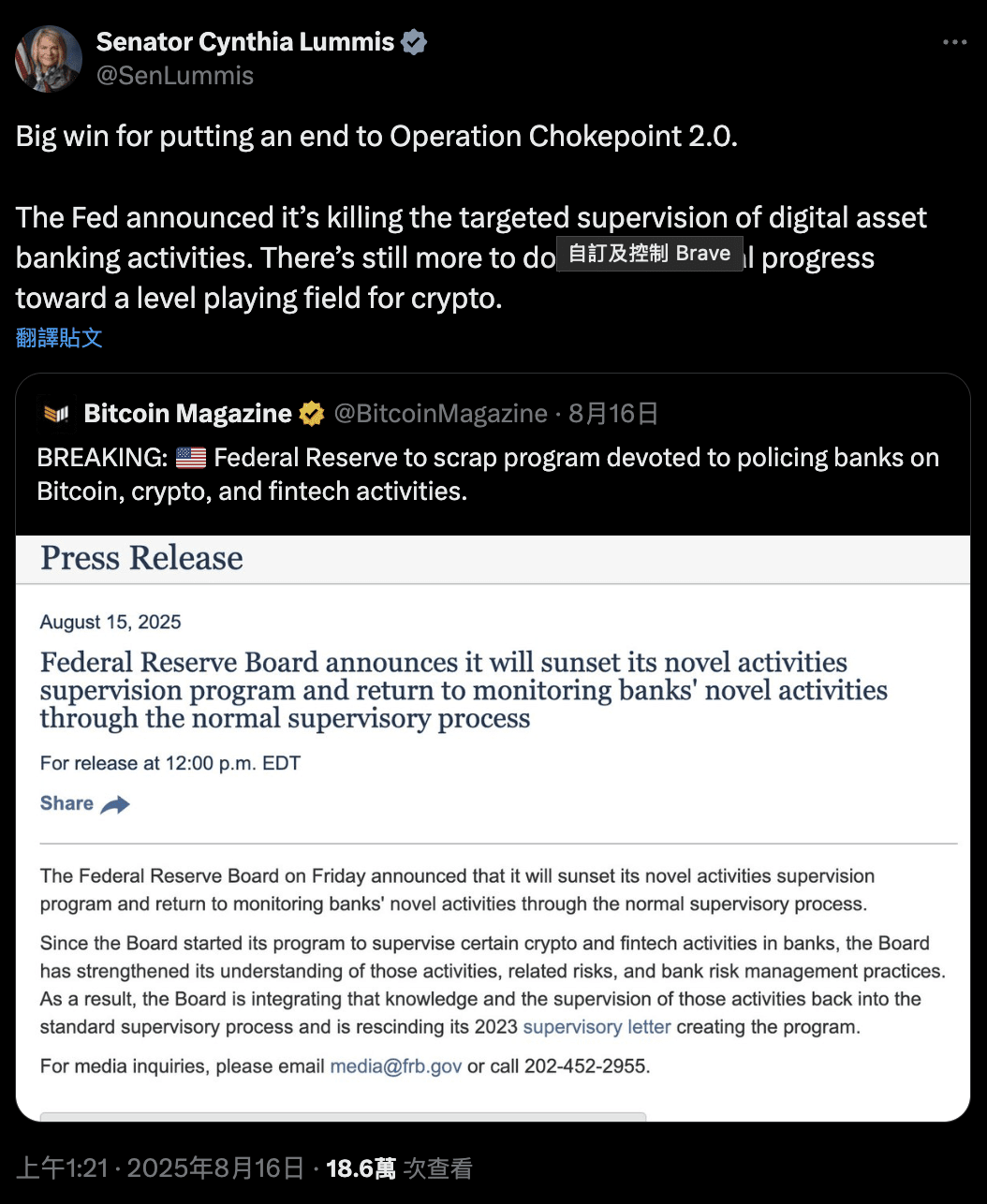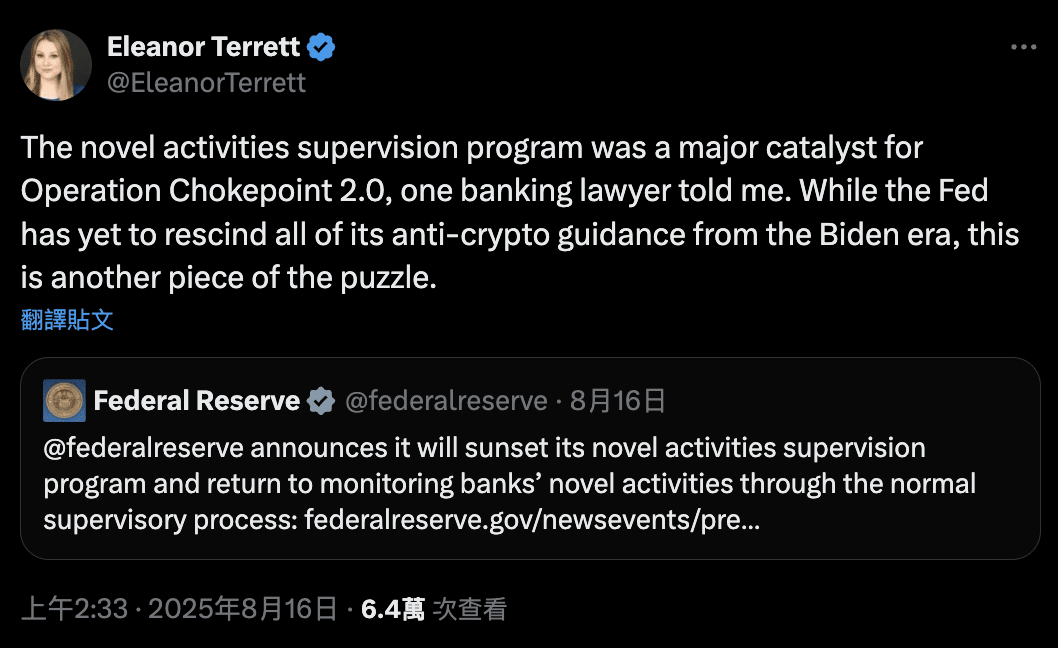The Federal Reserve has terminated the emerging activities supervisory program, returning the cryptocurrency banking industry to regular oversight.
The U.S. Federal Reserve (Fed) announced last Friday (8/15) that it will terminate its special supervisory program targeting banks' cryptocurrency businesses and integrate related supervisory work back into standard regulatory processes.
The Federal Reserve stated in a statement: "Since the board began supervising specific cryptocurrency and fintech activities, it has strengthened its understanding of these activities, associated risks, and banking risk management practices."
This 'Emerging Activities Supervisory Program' was initiated in August 2023, requiring banks engaged in cryptocurrency custody, stablecoin issuance, tokenization services, and other businesses to notify the Federal Reserve in advance and follow strict guiding principles. The program covers areas including cryptocurrency asset custody, cryptocurrency-backed lending, stablecoin issuance and distribution, as well as institutions focused on providing traditional banking services to entities related to cryptocurrency assets and fintech companies.
The Federal Reserve stated that after two years of supervisory experience, it has gained a full understanding of the operational models and risk characteristics of these emerging financial activities, and has decided to integrate the accumulated knowledge and supervisory functions into the standard supervisory process. The agency also rescinded the supervisory letter created in 2023 for this program, meaning that future cryptocurrency-related businesses will be regulated through 'normal supervisory procedures' rather than a specialized program with stricter guiding principles.
The Trump administration's anti-debanking policy has been effective, and regulators have fully shifted to a friendly stance.
The Federal Reserve's action echoes the executive order signed by President Trump last week, which aims to end unfair banking practices based on religion, politics, or other ideologies. The executive order specifically mentions 'Operation Chokepoint' and accuses the Federal Reserve of compelling the banks it regulates to cut ties with cryptocurrency companies, and demands that banking regulators terminate any guiding principles used for targeted attacks on businesses and individuals.
Since Trump took office in January, regulators have adopted a more friendly attitude toward the digital asset industry. In April of this year, the Federal Reserve withdrew its previous guidance requiring banks to obtain approval from government regulators before engaging in new cryptocurrency activities. Two other federal banking regulators, the Office of the Comptroller of the Currency (OCC) and the Federal Deposit Insurance Corporation (FDIC), also took corresponding actions to rescind prior guidance, allowing banks to make cryptocurrency decisions under existing risk management expectations.
The Securities and Exchange Commission (SEC) under new leadership has also dismissed several lawsuits against digital asset companies initiated during the Biden administration and launched 'Project Crypto' to update digital asset regulations. The FDIC further indicated that financial institutions can engage in cryptocurrency activities without prior notification.
Further Reading
SEC launches crypto program! Aiming to bring U.S. financial markets on-chain? Check out the five core visions at once
Three regulatory agencies voice their opinions! U.S. banking custody regulations for cryptocurrencies are out: must bear all risks
Ignoring public opinion? The Federal Reserve cancels 'reputational risk' reviews; why is this a major victory for the crypto industry?
The U.S. gives the green light! Banks can provide cryptocurrency services, and crypto companies are applying for banking licenses
Leaders in the cryptocurrency industry welcome the policy shift, stating it ends Operation Chokepoint 2.0
Senator Cynthia Lummis, a supporter of cryptocurrencies, posted on the X platform that the Federal Reserve's action is a significant victory in ending Operation Chokepoint 2.0. She pointed out: "The Federal Reserve announced the termination of targeted supervision of digital asset banking activities. While there is still more work to do, this is a real step forward toward a fair competitive environment for cryptocurrencies."
 Source: X/@SenLummis Cynthia Lummis stated that the Federal Reserve's action is a significant victory in ending Operation Chokepoint 2.0
Source: X/@SenLummis Cynthia Lummis stated that the Federal Reserve's action is a significant victory in ending Operation Chokepoint 2.0
Strategy co-founder Michael Saylor commented, 'The path for Bitcoin and the banking industry is now clear.' The company holds 628,946 Bitcoins, making it the largest Bitcoin inventory company in the world. Reporter Eleanor Terrett quoted legal opinions pointing out that the emerging activities supervisory program was a major catalyst for Operation Chokepoint 2.0. Although the Federal Reserve has not yet rescinded all anti-cryptocurrency guiding principles from the Biden era, this is an important piece of the puzzle.
 Source: X/@EleanorTerrett Eleanor Terrett quoted legal opinions stating that the emerging activities supervisory program was a major catalyst for Operation Chokepoint 2.0
Source: X/@EleanorTerrett Eleanor Terrett quoted legal opinions stating that the emerging activities supervisory program was a major catalyst for Operation Chokepoint 2.0
For years, leaders in the cryptocurrency industry have condemned U.S. banking regulatory policies as systemic and coordinated actions aimed at denying banking services to digital asset companies and limiting their growth. This plan, known as 'Operation Chokepoint 2.0', borrowed its name from 'Operation Chokepoint' during the Obama administration, which aimed to cut off banking services to gun dealers, payday loan companies, and other 'high-risk' businesses.
Regulatory integration brings efficiency improvements, and banks' cryptocurrency businesses welcome new opportunities
The Federal Reserve emphasized that last month it confirmed with other banking regulatory agencies that banks can custody crypto assets, and the same rules applicable to the custody of other assets will also apply to cryptocurrency custody practices. This decision provides a clearer regulatory framework for the banking industry, allowing financial institutions to hold digital assets for clients under existing custody standards.
The establishment of this emerging activities supervisory program is set against the backdrop of the 2023 banking industry crisis, during which three U.S. banks closely tied to tech and cryptocurrency clients—Silicon Valley Bank, Silvergate Bank, and Signature Bank—collapsed one after another.
Regulators at the time believed that special expertise and closer attention were needed for innovations and untested technologies that could pose risks to the banking system.
Federal Reserve Vice Chair Michelle Bowman earlier this year called for regulators to "remain open to innovation in the banking system" while maintaining safety. The board stated that, with the knowledge gained from overseeing cryptocurrency and fintech activities over the past two years, it is confident in addressing these businesses through regular regulatory channels. This policy shift is expected to enhance regulatory efficiency and reduce compliance burdens on banks, creating a fairer competitive environment for the cryptocurrency industry.
'Trump's new policy takes effect, the Federal Reserve eases thresholds for cryptocurrency businesses; could U.S. crypto banks be making a comeback?' This article was first published in 'Crypto City'.


